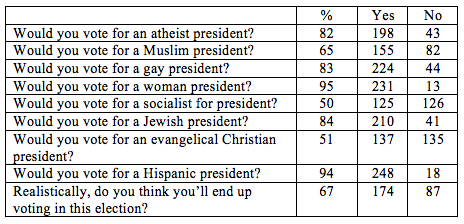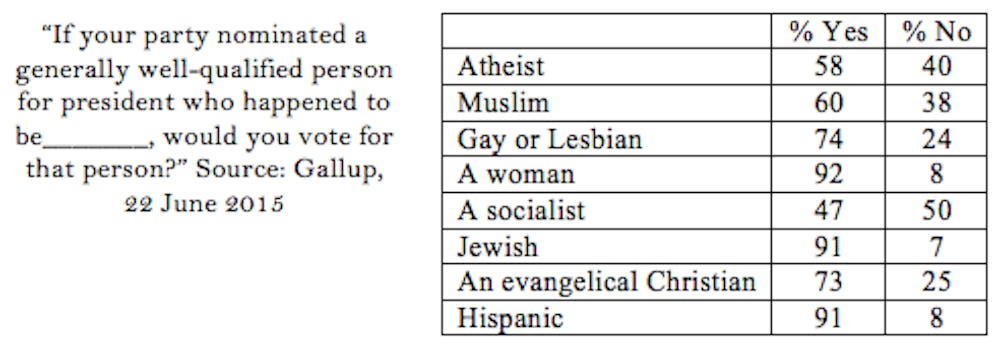By ABBY BIESMAN News & Features Editor
Students responded last week to polls on Whatsgoodly, an app that creates polls for certain locations, asking them about
their likelihood to elect candidates of particular backgrounds for president. The poll was modeled off of the Gallup poll.
A traditional Gallup poll was conducted via telephone between Jun. 2-7, 2015. 1,527 adults were surveyed. Gallup posed this question in their poll: “If your party nominated a generally well-qualified person for president who happened to be ______, would you vote for that person?”
In response to the Whatsgoodly results, students felt different qualifiers, such as religious beliefs and race, might differentiate the Whatsgoodly results from the national results.
“I think that people’s voting choices are to some extent subconsciously influenced by preconceived notions,” Sophomore Anna Du wrote in an email to The News-Letter.
Socialism received mixed reactions from students. Some students were surprised by these low results given the popularity of Bernie Sanders, a self-proclaimed democratic socialist. Sophomore Christine Adib commented on this.
“I’m kind of surprised that the socialist president only got 50 percent when Bernie Sanders is really huge on college campuses,” Adib said.
Senior Nadine Abdullat believes there might be a discrepancy between how people perceive Bernie Sanders as a person versus as a political candidate.
“They don’t necessarily reconcile the fact that he calls himself a socialist with his policies,” Abdullat said. “Socialism is a very misunderstood political movement in America.”

Because, as with any belief, socialism might be misunderstood by Americans, some may be misinformed about the policies and ideology behind socialism, conflating socialist ideas with the capital-C Communism of the Soviet Union and Mao-era China. Kapadia further commented on Americans’ relationship to socialism.
“Socialism has a lot of aspects that have proven well in other countries, but I think a large part of the population is still hesitant about [socialist ideas],” Kapadia said.
Fifty percent of respondents on Whatsgoodly said they would vote for a socialist president. According to the Gallup poll, 47 percent of people would vote for a socialist president.
People’s likelihood to vote for an Evangelical Christian was also divided. Kapadia suggested that people might not be attracted to connotations associated with evangelical Christianity.
“I think evangelical Christianity might be associated more with “in-your-face” type of idealism, and I think there would be a lot of resistance towards that, especially in terms of how that would influence the church and state relationship and how it might result in certain social movements,” Kapadia said.
There were natural discrepancies in the Whatsgoodly vote given the small sample responding to questions. Adib commented on whether or not she believed the Whatsgoodly polling was representative of the whole country.
“I definitely don’t think it represents it well,” Adib said. “In my world, I would say it does, but I’m also not associated with rural areas where they definitely would not vote in atheist, a Muslim, a gay, maybe even a woman president.”
Kapadia said that voting for an atheist president was correlated to the progressive ideals of younger voters like college students, given that sometimes religiosity is often associated with age. According to the Gallup poll, 58 percent of people would vote for an atheist president. 82 percent of people who responded to the Whatsgoodly poll responded they would vote for an atheist president.
“We’re more progressive in general, and we’re more open-minded to believe that atheists would have a similar moral background to make the same decisions as someone who has a strong religious background,” Kapadia said.





